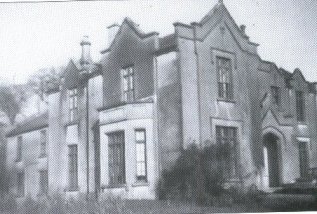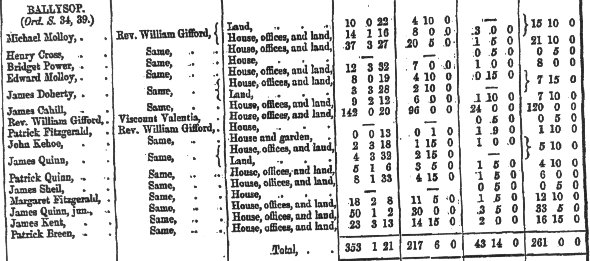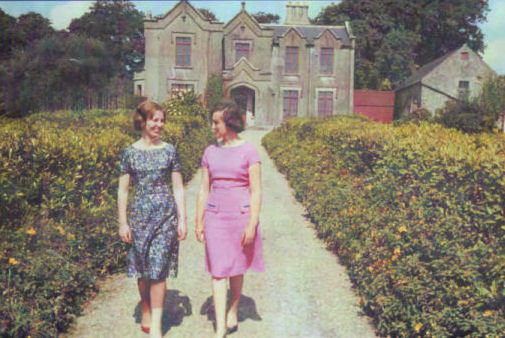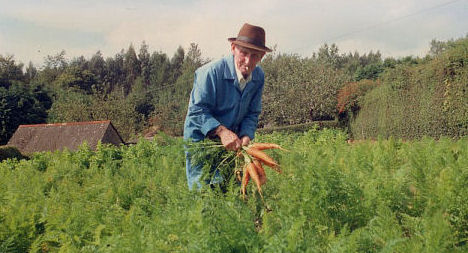| |
Local
History
|
Ballysop
House
|
|

|
Ballysop House,sadly,is
no longer standing. It was demolished in 1965 to make
way for John F.Kennedy Arboretum and Park which was
opened on May 29th 1968. In 1798 it was the headquarters of the rebels when they camped
at Slieve Coillte from June7th -10th.Two monkey puzzle trees grow where the
house once stood.
Jasper Gifford emigrated from England to Ireland,
initially to Dublin where Burke's Landed Gentry notes
that he "purchased, by deed, dated 20 July 1661,
the lands of Polemaloe (now called Pilltown),
Whitechurch, and Ballykelly, Co. Wexford". He
settled in Polemaloe. His son William sold his
estate to his son-in-law, George Glascott.
In 1837 Rev.William Gifford lived here. The Giffords and
the Glascotts were related by marriage and were the main
landlords in the parish. In 1876 Nicholas Gifford owned
1,891 acres at Ballysop.
|
 |
Above is an extract from Griffiths
Valuation 1853 showing the tenants who rented land from
Rev.William Gifford at Ballysop.The area covers over 353
acres. He also owned the townlands of Aclare, Ballybrazil, Curraghduff and
Ballymaclare. |
Ballsop House was a fine house with a drawing room,
diningroom,large hall, bathroom, bedrooms,
pantries and servants'
apartments. Outside was a coach house and stables for
six horses and a lovely garden.
Frank Doyle bought the house from the Rice family after
he sold Dunmain House and farm to the Conway family in
1917. He
was a brother to Major Doyle who owned Brandon House
Hotel. Frank, a bachelor, had up to eight workers
employed on the farm and in the house. Jimmy O'Brien,
Ballsop, was the ploughman. Paddy Mac Donnell, New Ross,
was a general farmhand. Johnny Kehoe, Ballybrazil, was
the herdsman. Stephen Kehoe, The Mountain, was another
general farmhand. Jimmy O'Brien Jnr.,Ballysop was the chauffeur.
The cooks and house keepers were Eileen and Bridie Ryan
from Dunbrody and Maura McCarthy, Yoletown.
Frank's two sisters lived with him in Ballysop. Mona and
Babe remained spinsters. Frank was keen sportsman and
won many golf trophies. He was also a keen gamesman and
provided much of the fowl for the dinners at Ballysop
House. He retired to Fethard after selling Ballysop to
the Land Commission in the early sixties. |
|

|
|
Mary Ann and
Josie Ryan of Dunganstown at Ballysop House in 1963 |
|
The following is part of the
debate in Dáil Éireann, Dec.10,1964 between the
Wexford TD, Sir Anthony Esmonde and Mr.Moran the then
Minister for Lands on the demolition of Ballysop House. |
|
Mr.Esmonde:
"They have taken over Ballysop estate. I am
informed that the original house—Ballysop House, built
about 120 years ago is to be demolished and in its place
a modern structure is to be erected. I have made
representations to the Minister's Department on this
subject, but somebody—some architect, some planner or
somebody within the Civil Service itself acting on the
direction of the Minister—has decided this building
must go.
There is very strong feeling in Wexford on this
subject. I am voicing the opinion of my constituents
that this house should be allowed to stand. The Forestry
Division say: “We must demolish this house if we are
to build a suitable college or whatever will be
there.” Further representation has been made to me
that as this memorial is associated with the Kennedy
family, who are very interested in the problem of
retarded children, the house should be left where it is
and used for the care of such children. There are plenty
of rooms in it and it is on a beautiful site overlooking
the mountains. The reason I am making this plea to the
Minister is that the Kennedy family are perhaps the
greatest supporters and helpers of organisations for
retarded children. It would be a fitting memorial if
this house were left for that purpose. It is a fine
house and it would cost thousands to build its like
today.
I know that what is known as a policy decision has
been taken by the Department that this house must be
swept away. I am trying to urge on behalf of my
constituents, on behalf of public opinion in Wexford for
which I am qualified to speak, that the Minister should
seriously take another look at this. I only hope the
bulldozers have not already been sent down to perpetrate
what I consider would be an outrage on this fine old
Wexford residence."
Mr.Moran:
"Deputy
Esmonde referred to an old house, the location of which
is earmarked as the site for the administration building
to be erected in connection with the John Fitzgerald
Kennedy Memorial Park in Wexford. I have seen it and, in
my judgment, firstly, it is in a hopeless state of
repair and would cost a fortune to do anything with it,
and secondly, it would be completely unsuitable for the
purpose for which Deputy Esmonde suggested it could be
used. It would be unsuitable to house the people Deputy
Esmonde suggested it should house, being beside the
administration building in this Memorial Park and beside
the new agricultural school being erected on that site.
I am advised by those who are competent to judge these
matters that the cheapest and best thing to do is to
knock it down. Even if the building itself were
suitable, for the reasons I have given—location and so
forth—it would certainly not be suitable to house the
type of people the Deputy suggested."
|
|

|
|
Well known Ballysop man, George Harrell, who
passed away in October 07 aged 97. George lived near
the Kennedy Park entrance and was a keen gardener and
card player. He was also an avid bee keeper and one time
shopkeeper. |
|
U.S
plane crashes in Ballsop, Feb 5th 1943.
|
|

|
|
|
|
This is a photograph of
the American Airacobra which is similar to the one that
crash-landed in Ballysop in Feb. 5th 1943. |
|
Not only was Campile bombed
during World War 2 but an American fighter airplane
called the Airacobra crashed landed in Ballysop. It
crashed in Frank Doyle's field called the 'Long Run'
where he used train horses. The first people to arrive
at the scene of the crash were Frank and George Harrell.
The crash happened at 2pm and the plane travelled about
thirty feet before coming to rest. The pilot was
uninjured and was brought to Ballysop House for a meal.
The plane was later dismantled and taken to Baldonnel.
The Airacobra was on way to Africa but was separated
from the other aircraft due to bad weather in the Bay of
Biscay. The pilot attempted to return to England but
lost his way and had to crash land in Ballysop.
|
|
Please
return to Local History |
|
|
|

